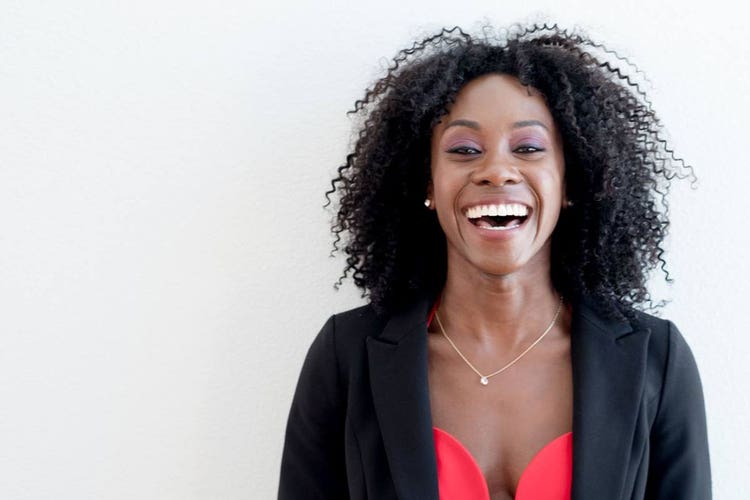How Danetha Doe Launched Her Money Management Career—With a Mimosa

Danetha Doe knew she wanted to be an entrepreneur when she was 8 years old.
“I asked my parents for business cards for my eighth birthday. At the time, I was going to be the best nail artist. I had two clients: my mom and her girlfriend. And that was the first of many failed business attempts in my life,” Doe says, laughing.
But early failure didn’t deter Doe, who studied economics and accounting in college because she knew being an entrepreneur was her path. She continued to take risks—like trying out to become an NFL cheerleader with zero dance experience—and ended up on the squad for the Indianapolis Colts. “I still don’t know why they took me,” Doe says, but it did give her inspiration for her next entrepreneurial idea.
“I started a business creating activewear for dancers and cheerleaders. I thought, ‘I know the dance world. I have some business sense from school. Let me create a business.’ And that was a complete disaster. I lost so much money, and I completely made a mess of a business,” Doe says.
Despite another failed business venture, Doe began to learn the ins and outs of true entrepreneurship.
From mimosas to money
After moving to the Grand Canyon for a seasonal position, then another seasonal gig in Mammoth Lakes, California, Doe got a role as a staff accountant, where she really started to put her business knowledge into practical application. Eventually, she and her beloved—they met in Mammoth—decided to move to the San Francisco Bay Area, where Doe was “bitten by the entrepreneurial bug again.”
While she had lined up a job in the Bay Area, by noon on her first day, Doe knew that sitting in a cubicle wasn’t for her. “I couldn’t put words to it. It was just this feeling that I wasn’t supposed to be there. And I quit that day,” she says. Doe headed to a cafe and ordered a mimosa (yes, a mimosa), and started writing out her business plan.

Today, her financial consulting and planning business, Money & Mimosas, teaches companies how to plan and manage their own books. Doe mainly works with women, who want to feel empowered around managing their finances. “They want someone to help guide them when they are ready to hire a new staff member or transition from just being an online business to a brick-and-mortar spot,” she explains. “What are all the financial steps they need to check off to make that happen?”
To date, Doe has worked with dozens of small-business owners, as well as big-name clients such as Google, Neiman Marcus and Audi.

Money and social impact
For Doe, financial planning is significant not only on the individual and business level but also on a community and global level.
“Sometimes we think of money as an object—paper in our wallets or numbers in our bank account. But money is truly a reflection of self-love,” says Doe, who equates financial health with physical health. “If you care about your body, you’re going to go to the gym. The same thing goes for your finances. You’re going to do the little bit extra to make sure that you’ve got a cushion in case something happens. Stressing about finances harms your mental health, your physical health and certainly your ability to truly be present in the world.”
On a global level, our ability as individuals to be not only secure financially but also to thrive financially will allow us to use our dollars to support whatever cause we feel is important. For example, Doe says, if you care about taking care of the planet and environment, and if you’re in a financial position to help, that is going to impact your community and the world.
“Managing your finances is of course good for the individual self, but it’s also your duty as a member of society to be in a place where you can effect change in a way that you see is most important,” she says.
Habits of successful financial planners
24Life asked Doe to pinpoint some of the habits of successful financial planners—people who have a good and healthy relationship with money. Here were a few she shared.

Know your money story
Ask yourself some questions about your relationship with money, Doe says. “What did you see growing up? Did you see both your parents talking about money or only one of them managing the money? Did one of your parents save a lot? Did the other spend a lot? Were there fights around money? What’s your cultural upbringing around money? (There are some cultures where it’s taboo to talk about money.) What is your story around money? Don’t judge it. Just become aware of it.”
Have a weekly money date
Doe calls this your “money and mimosas date.” Every Friday, Doe drinks a mimosa and goes through her finances, looking at what she spent the previous week and what money came in.
“[See] if where you’ve spent your money the previous week really is in alignment with what your values are,” she says.
Doe recommends using free apps like Mint, Personal Capital and Status Money, which make it easy to track your previous week’s expenditures. “They also do a good job at the end of the month of giving you a pretty graph to look at to see where your money was spent,” she says.
Know your values
“And that leads to the next step, which is getting clear about what money means to you,” Doe says. “Money, in and of itself, is not the end of the story. Money is a tool. It’s a vehicle to get you to where you want to be or to maintain what you have.”
Evaluate what money means to you. Does it mean security? This may manifest as having more money in savings. If money represents pleasure, that may mean that you spend more money going on vacations. “Get really clear on those values, and make sure that you are using your money to support those values.”
Have multiple income streams
Most businesses have multiple revenue streams. Where it gets tricky, Doe says, is on an individual level.
“I was working as an accountant for a company, and we went through a pretty terrible downturn,” Doe says. “One season we didn’t have good business and our pay was cut by 20 percent. It’s a lot of money. That could’ve cut into my ability to pay rent, food. The thing that saved me was I was also teaching Zumba classes on the side. The exact number that had been cut out of my paycheck was what I was making with my side hustle. So although I still felt it, my livelihood wasn’t impacted.”
Doe recommends that even if you are working a traditional job, have something on the side that ensures you can be financially independent if something ever happened to your “day job.”
“It doesn’t have to be that drastic,” she says. “But whatever happens, you have something going for you that can support you.”
Photo credit: Danetha Doe, Brianna Doe